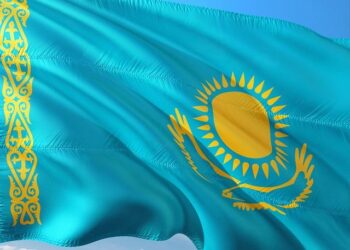In a shifting geopolitical landscape, India is exploring new avenues to strengthen its strategic foothold in Central Asia, with Kazakhstan emerging as a pivotal partner. As China expands its influence along the traditional Silk Road corridors, India’s engagement with Kazakhstan signals a potential “road less Chinese” – a calculated effort to diversify its regional ties and secure alternative trade and energy routes. This development, reported by The Economic Times, underscores the growing importance of Kazakhstan in India’s broader foreign policy and economic strategy amid increasing regional complexities.
India explores strategic engagement with Kazakhstan to counterbalance Chinese influence
Amid growing concerns over China’s expanding geopolitical footprint in Central Asia, India is recalibrating its foreign policy approach by intensifying diplomatic and economic ties with Kazakhstan. The Central Asian nation’s strategic location as a gateway between Asia and Europe presents India with a valuable corridor to diversify its regional partnerships. Recent dialogues focus on enhancing trade, energy cooperation, and connectivity projects that could serve as a counterbalance to Beijing’s Belt and Road Initiative, which India has cautiously opposed due to sovereignty concerns.
Key areas of strategic engagement include:
- Infrastructure Development: Collaborative efforts on road and rail connectivity to facilitate smoother trade routes bypassing sensitive borders.
- Energy Cooperation: Joint ventures in oil, gas, and renewable energy sectors to meet the growing energy demands of both nations.
- Security and Intelligence Sharing: Counterterrorism and border security coordination to stabilize the wider Eurasian region.
| Sector | India-Kazakhstan Current Status | Potential Growth |
|---|---|---|
| Trade Volume | Approx. $1.2 billion | Projected 15% annual increase |
| Energy Projects | 4 major joint ventures ongoing | Potential to double in 5 years |
| Connectivity Corridors | Limited rail links | New multimodal corridors under planning |
Economic opportunities and geopolitical advantages in deepening India Kazakhstan ties
India’s expanding engagement with Kazakhstan opens a gateway to untapped economic corridors and strategic footholds in Central Asia, positioning it as a crucial counterbalance amid the dominance of Chinese influence. With Kazakhstan’s vast reserves of energy resources, including oil, natural gas, and uranium, Indian investments in these sectors promise to diversify its energy portfolio and secure long-term supply chains. Furthermore, Kazakhstan’s location as a land bridge connecting Europe and Asia offers India enhanced access to the Eurasian markets, facilitating smoother trade flows and reducing dependence on maritime routes.
Beyond energy, the collaboration extends into sectors such as infrastructure, information technology, and agriculture, amplifying bilateral trade and fostering innovative cooperation. Key benefits include:
- Strategic Rail Links: Enhanced connectivity via the International North-South Transport Corridor (INSTC) to bypass congested maritime routes.
- Joint Ventures: Collaborative ventures in technology parks and special economic zones promoting knowledge exchange and job creation.
- Security Cooperation: Shared interests in counter-terrorism and regional stability strengthen geopolitical alignments.
| Sector | Potential Impact | Timeline |
|---|---|---|
| Energy | Stable fuel supply & investment returns | 2024-2030 |
| Infrastructure | Improved connectivity & transit routes | 2025-2028 |
| IT & Innovation | Tech hubs, startups, and knowledge transfer | 2024-2026 |
Recommendations for strengthening infrastructure and diplomatic cooperation in Central Asia
Enhancing connectivity in Central Asia demands not just infrastructural investments but also a robust framework for diplomatic engagement. Prioritizing multimodal transport corridors-linking rail, road, and air networks-can facilitate smoother trade flows and reduce dependency on traditional routes dominated by larger powers. India’s strategic collaboration with Kazakhstan offers a promising template, wherein joint projects focusing on smart highways, energy pipelines, and communication networks could bolster regional integration. Moreover, leveraging technology-enabled border management systems may dramatically cut down transit times and elevate security standards across these corridors.
On the diplomatic front, fostering trust through regular high-level summits and multilateral platforms is essential to align interests and resolve potential conflicts. Key initiatives should include:
- Bilateral joint working groups dedicated to infrastructure planning and crisis response.
- Legal frameworks for cross-border trade and investment protection.
- Collaborative energy sharing agreements emphasizing renewables and sustainability.
Such measures can create a resilient cooperative environment that balances competing influences and builds a multipolar order in Central Asia.
| Priority Area | Proposed Initiative | Expected Impact |
|---|---|---|
| Transport | Integrated Rail-Road Links | Reduced transit time by 30% |
| Energy | Renewable Energy Grid Sharing | Enhanced energy security |
| Diplomacy | Annual Strategic Dialogues | Improved bilateral trust |
To Conclude
As India explores deeper ties with Kazakhstan, seeking strategic balance amid shifting regional dynamics, the Central Asian nation emerges as a potential cornerstone in New Delhi’s broader foreign policy. Navigating a path less influenced by China, India’s engagement with Kazakhstan not only underscores its intent to diversify partnerships but also highlights a pragmatic approach to securing economic and geopolitical interests. How this developing relationship will reshape regional alignments remains to be seen, but one thing is clear: India’s road through Kazakhstan is a calculated step toward a more multifaceted and resilient strategic framework.
















